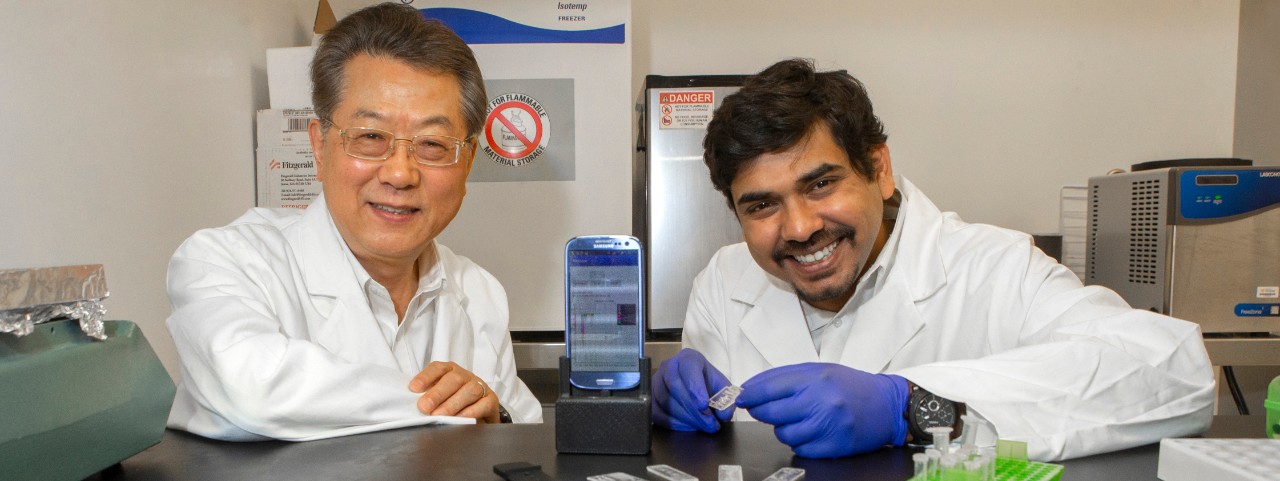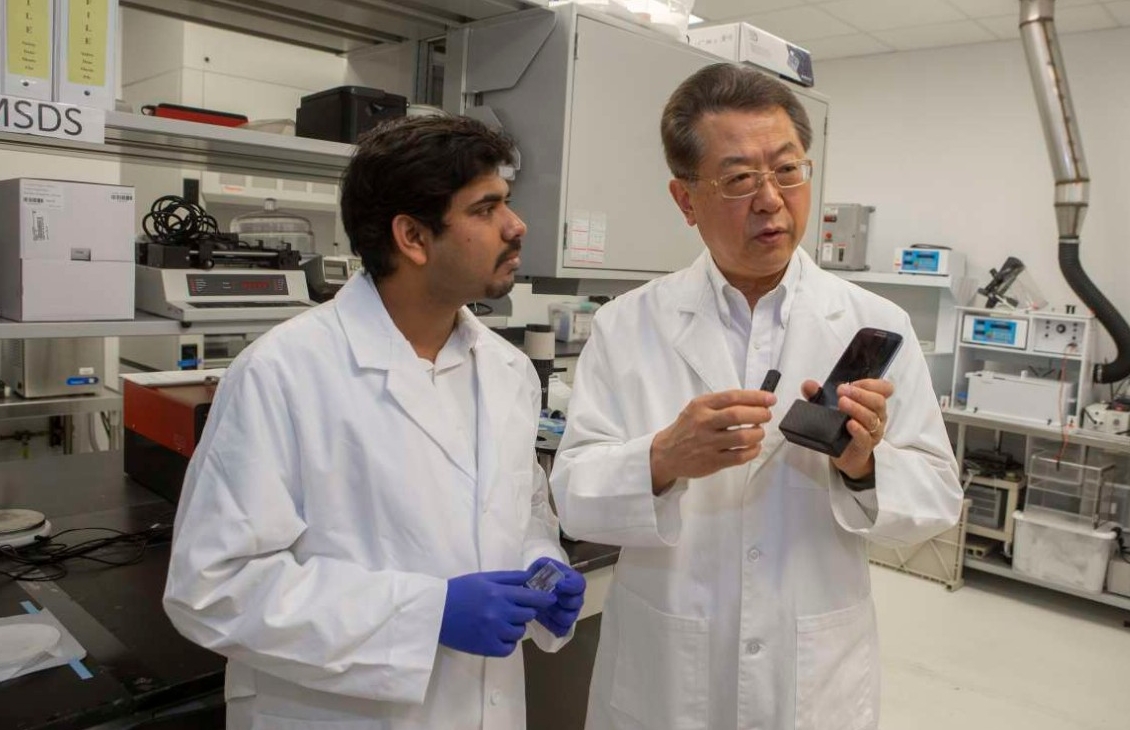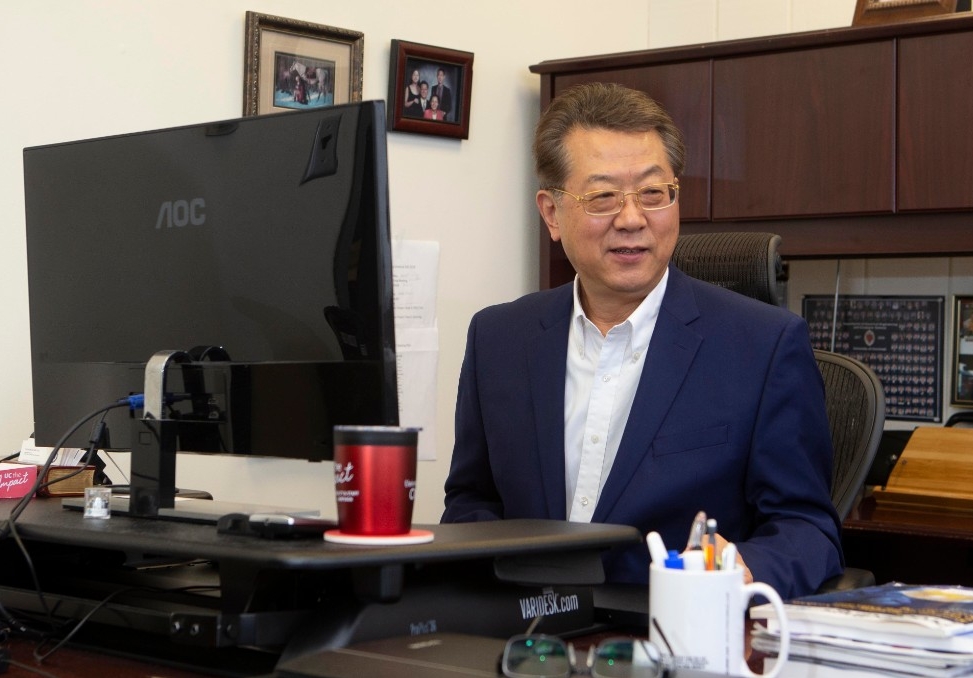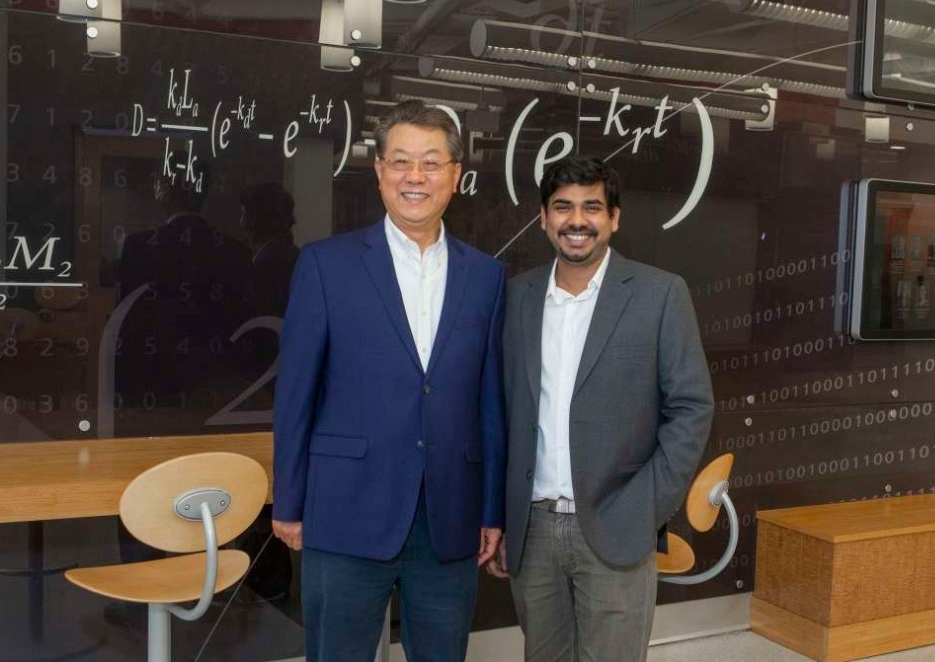
UC smartphone lab delivers test results in 'spit' second
The mobile health tool plugs into your phone to diagnose illnesses such as malaria
Using your phone to diagnose disease or track your medical condition is the holy grail for remote health monitoring.
So far it’s been impractical to combine the two in a single device. Tech companies don’t want the regulatory headaches that would come from labeling phones medical devices.
But University of Cincinnati engineers have come up with the next best thing.
UC professor Chong Ahn designed a tiny portable lab device that plugs into a phone, connecting it automatically to a doctor’s office through a custom app UC developed. With a single drop of blood or saliva on a custom plastic lab chip UC designed, the device smaller than a credit card can diagnose infectious diseases.
And while Ahn's latest study did not expressly look at coronavirus, he said it would have similar applications in diagnosing infectious diseases or tracking health conditions like depression and anxiety.
The phone provides the power and test protocol to the lab chip. A patient simply puts a single-use plastic lab chip into his or her mouth then plugs that into a slot in the box to test the saliva.

UC engineering professor Chong Ahn, right, and graduate student Sthitodhi Ghosh discuss the science behind their portable smartphone lab accessory. Photo/Joseph Fuqua II/UC Creative Services
Published in Nature journal
The device automatically transmits results to the patient’s doctor through a custom app UC created for nearly instant results.
In his latest study, Ahn and his research team used the smartphone device to test for malaria. But the device could be used for smart point of care testing for countless chronic or infectious diseases or to measure hormones related to stress.
“Everybody has a phone – more than 3 billion people,” Ahn said. “So how can we use that technology to test for infectious diseases such as coronavirus? It’s a rapid diagnostic tool you can use at home. Right now it takes several hours or even days to diagnose in a lab, even when people are showing symptoms. The disease can spread.”
Ahn’s study on malaria was published in January in the Nature journal Microsystems & Nanoengineering.
The project demonstrates UC’s commitment to research as described in its strategic direction called Next Lives Here.
This is the future of personal healthcare.
Sthitodhi Ghosh, UC engineering student
Ahn is an electrical and biomedical engineering professor in UC’s College of Engineering and Applied Science. He directs two centers on campus, the Engineering Research Center Cleanroom and the Ohio Center for Microfluidic Innovation. UC honored him last year as a distinguished research professor.
His research team created a novel lab chip that uses natural capillary action, the tendency for a liquid to adhere to a surface, to draw a sample down two channels called a “microchannel capillary flow assay.” One channel mixes the sample with freeze-dried detection antibodies. The other contains a freeze-dried luminescent material to read the results when the split samples combine again on three sensors.
Ahn said the device is accurate, simple to use and inexpensive.
“The performance is comparable to laboratory tests. The cost is cheaper. And it’s user-friendly,” Ahn said. “We wanted to make it simple so anyone could use it without training or support.”
Improving mental health

UC engineers developed a smartphone app that can record and transmit test results from a portable lab that people can plug into their phones. The lab uses saliva from plastic test strips that people put in their mouths like a sucker. Photo/Joseph Fuqua II/UC Creative Services
UC doctoral student Sthitodhi Ghosh, the study’s lead author, said the biggest advancement in the device is in the novel design of its tiny channels that naturally draw the sample through the sensor arrays using capillary flow. Ahn is Ghosh’s Ph.D. advisor.
“The innovation of this device is using a capillary-driven microfluidic lab chip,” Ghosh said. “So the entire test takes place on the chip automatically. You don’t have to do anything.
“This is the future of personal healthcare,” Ghosh said.
While the device has applications for diagnosing or monitoring viruses or other diseases, Ahn said he sees potential in the field of mental health. Mental health providers already use smartphones to track the wellness of patients through regular surveys. But psychosocial data can be subjective.
Ahn recalled the excruciating stomach ache he felt when he was hospitalized for an infection. He had trouble translating how he felt on a pain scale of 1 to 10 for his doctors. The pain left him feverish and soaked in sweat, but he reasoned it could surely be worse.
“I said, ‘I’m a 2’ so they didn’t give me pain medicine. My wife says, ‘Honey, you almost died! Take the pain medicine.’ So from then on I said I was a 6 or 7 and I got pain medicine and I was good,” he said.

Chong Ahn is a distinguished research professor in UC's College of Engineering and Applied Science. Photo/Joseph Fuqua II/UC Creative Services
Evidence-based treatment
By routinely testing hormones or other biomarkers associated with depression or anxiety, Ahn said he could help doctors correlate how patients feel with actual changes in their biochemistry. This could improve treatment for countless patients, he said.
And the device can use saliva as well as blood, which is less invasive and stress-inducing than a finger prick.
“If you’re stressed from doing a finger prick, it’s already creating a bias in the testing of stress,” Ghosh said. “That’s why we’re moving to a noninvasive method.”
Ahn is pursuing a patent to commercialize his device. Medical diagnostics company Mico Biomed, which has offices in Cincinnati, is a co-author of the study.
The biggest hurdle could be making people feel confident and comfortable enough to use the unfamiliar device at home, he said.
But the vast amounts of data collected from the tests over time could help psychiatrists better understand the biochemistry underlying mental illness, which could lead to better evidence-based treatments, he said.
“My dream for the rest of my career at UC is to improve public and mental health by providing a new mobile health tool,” he said.
Featured image at top: UC engineering professor Chong Ahn, left, and his graduate student Sthitodhi Ghosh show off their smartphone device in his electrical engineering lab.

UC biomedical and electrical engineering professor Chong Ahn, left, and his graduate student, Sthitodhi Ghosh, are working to improve mobile healthcare devices. Photo/Joseph Fuqua II/UC Creative Services
Next Lives Here
The University of Cincinnati is classified as a Research 1 institution by the Carnegie Commission and is ranked in the National Science Foundation's Top-35 public research universities. UC's graduate students and faculty investigate problems and innovate solutions with real-world impact. Next Lives Here.
Become a Bearcat
- Apply online or get more information about undergraduate enrollment by calling 513-556-1100.
- Learn more about UC's many undergraduate and graduate programs.
Related Stories
UC celebrates record spring class of 2025
May 2, 2025
UC recognized a record spring class of 2025 at commencement at Fifth Third Arena.
‘Doing Good Together’ course gains recognition
May 1, 2025
New honors course, titled “Doing Good Together,” teaches students about philanthropy with a class project that distributes real funds to UC-affiliated nonprofits. Course sparked UC’s membership in national consortium, Philanthropy Lab.
DAAPworks reveals 2025 Innovation Awards – discover the winning...
May 1, 2025
Visionary projects stole the show during DAAPworks 2025, from wayfinding technology for backcountry skiers to easy-to-use CPR training kits for children.
